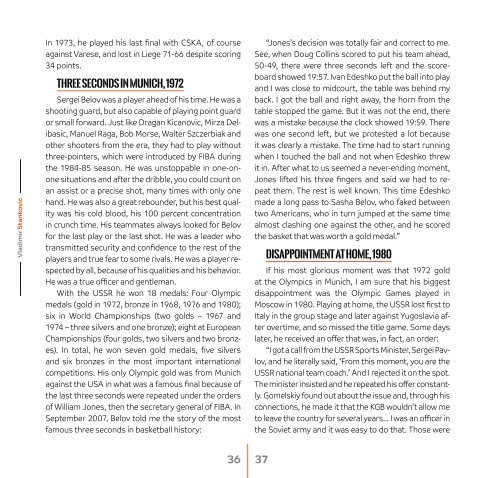101 Greats of European Basketball
You also want an ePaper? Increase the reach of your titles
YUMPU automatically turns print PDFs into web optimized ePapers that Google loves.
Vladimir Stankovic<br />
In 1973, he played his last final with CSKA, <strong>of</strong> course<br />
against Varese, and lost in Liege 71-66 despite scoring<br />
34 points.<br />
Three seconds in Munich, 1972<br />
Sergei Belov was a player ahead <strong>of</strong> his time. He was a<br />
shooting guard, but also capable <strong>of</strong> playing point guard<br />
or small forward. Just like Dragan Kicanovic, Mirza Delibasic,<br />
Manuel Raga, Bob Morse, Walter Szczerbiak and<br />
other shooters from the era, they had to play without<br />
three-pointers, which were introduced by FIBA during<br />
the 1984-85 season. He was unstoppable in one-onone<br />
situations and after the dribble, you could count on<br />
an assist or a precise shot, many times with only one<br />
hand. He was also a great rebounder, but his best quality<br />
was his cold blood, his 100 percent concentration<br />
in crunch time. His teammates always looked for Belov<br />
for the last play or the last shot. He was a leader who<br />
transmitted security and confidence to the rest <strong>of</strong> the<br />
players and true fear to some rivals. He was a player respected<br />
by all, because <strong>of</strong> his qualities and his behavior.<br />
He was a true <strong>of</strong>ficer and gentleman.<br />
With the USSR he won 18 medals: Four Olympic<br />
medals (gold in 1972, bronze in 1968, 1976 and 1980);<br />
six in World Championships (two golds – 1967 and<br />
1974 – three silvers and one bronze); eight at <strong>European</strong><br />
Championships (four golds, two silvers and two bronzes).<br />
In total, he won seven gold medals, five silvers<br />
and six bronzes in the most important international<br />
competitions. His only Olympic gold was from Munich<br />
against the USA in what was a famous final because <strong>of</strong><br />
the last three seconds were repeated under the orders<br />
<strong>of</strong> William Jones, then the secretary general <strong>of</strong> FIBA. In<br />
September 2007, Belov told me the story <strong>of</strong> the most<br />
famous three seconds in basketball history:<br />
“Jones’s decision was totally fair and correct to me.<br />
See, when Doug Collins scored to put his team ahead,<br />
50-49, there were three seconds left and the scoreboard<br />
showed 19:57. Ivan Edeshko put the ball into play<br />
and I was close to midcourt, the table was behind my<br />
back. I got the ball and right away, the horn from the<br />
table stopped the game. But it was not the end, there<br />
was a mistake because the clock showed 19:59. There<br />
was one second left, but we protested a lot because<br />
it was clearly a mistake. The time had to start running<br />
when I touched the ball and not when Edeshko threw<br />
it in. After what to us seemed a never-ending moment,<br />
Jones lifted his three fingers and said we had to repeat<br />
them. The rest is well known. This time Edeshko<br />
made a long pass to Sasha Belov, who faked between<br />
two Americans, who in turn jumped at the same time<br />
almost clashing one against the other, and he scored<br />
the basket that was worth a gold medal.”<br />
Disappointment at home, 1980<br />
If his most glorious moment was that 1972 gold<br />
at the Olympics in Munich, I am sure that his biggest<br />
disappointment was the Olympic Games played in<br />
Moscow in 1980. Playing at home, the USSR lost first to<br />
Italy in the group stage and later against Yugoslavia after<br />
overtime, and so missed the title game. Some days<br />
later, he received an <strong>of</strong>fer that was, in fact, an order:<br />
“I got a call from the USSR Sports Minister, Sergei Pavlov,<br />
and he literally said, ‘From this moment, you are the<br />
USSR national team coach.’ And I rejected it on the spot.<br />
The minister insisted and he repeated his <strong>of</strong>fer constantly.<br />
Gomelskiy found out about the issue and, through his<br />
connections, he made it that the KGB wouldn’t allow me<br />
to leave the country for several years... I was an <strong>of</strong>ficer in<br />
the Soviet army and it was easy to do that. Those were<br />
36<br />
37
















